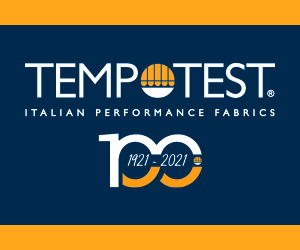Keystone Weaving Is America’s Latest Textile Success Story
May 31, 2013
LEBANON, PA—In less than five years, 83 year old Keystone Weaving Mills, Inc. has become a viable producer of mid to upper price point upholstery fabrics sold directly to the furniture manufacturer and jobber.
The transformation of Keystone started in 2008 when customers were running to China for goods and many local mills like Craftex, Quaker and Mastercraft and Weave met their demise. Since that time, many American customers, burned by poor quality and missed shipping dates from Chinese suppliers have turned back to American resources. Keystone has certainly benefited by this trend.  Eli Caplan and Bob McKinnon
Eli Caplan and Bob McKinnon
“We were within fifty cents a yard of the Chinese price on some goods,” said Bob McKinnon, a consultant to Keystone. He works closely with Sloan Caplan, CEO & President of this fourth generation family owned mill and also Scott McLaughlin, vice president of operations with 16 years at Mastercraft behind him.” McKinnon and McLaughlin have changed the culture of the mill from long runs of commodity products to short runs of a highly diverse novelty product range with many customers as opposed to the few that used to buy the linings. “We’re very critical about the people we bring on board. We want to develop uniqueness as a supplier,” McKinnon stressed. A new computer system was also part of the changeover to bring greater flexibility in dealing with customers, said Caplan.
Keystone focuses on cotton for half of its production and the balance is woven in linen and wool in price points of $8-$17 a yard with some very competitive fabrics in the $5-$7 range. Keystone is mostly a yarn dyed house with some piece dyed qualities. Aspect, a poly/cotton blend at $7.50, is a quick ship program in 16 colors for delivery in two to four days. Everything else is woven to order in two to four weeks. Minimum order is 50 yards with custom colors possible for 600 yards. Keystone is beginning to make extensive use of its sample warping machine purchased three years ago. This frees up its 16 Dornier looms with Bonas heads.
For Showtime, Keystone has divided its 80 new products into four ‘restaurant’ groupings: Gastro Pub, Modern Cuisine, Ethnic Group and Comfort Food in addition to some recolored successes like Carmel at $5.95; Summer and Pebble Beach at $9.95, the three top sellers for the company today. Matelasses are found in each group. Cotton, recycled cotton, linens and wools are the fibers of choice. Yarns are purchased outside as well as the finishing which features extensive use of washed fabrics. All finishing is done in Hickory, NC by American Custom Finishing.
Keystone is now proud to count among its most important customers companies like Century, Henredon and McCreary Modern. Keystone is being perceived as a viable local Made in the USA resource to American customers, right up there with Valdese and Sunbury in a natural fabric niche. “Keystone did this by giving the customer what it wants when it wants it; with no excuses,” says Bob McKinnon, veteran fabric man and consultant to Keystone these last four years. The one time president of Valdese, when it was doing less than $4 million in business is trying to do the same magic again with Keystone. The hope is that Keystone will eventually generate $50 million in sales within five years, says Sloan Caplan.
To help realize the sales potential, Keystone has hired four fulltime direct salesmen with Rueben Lentz in New York; Robin Starnes and Ray McKinnon in North Carolina and Ralph Skinner in Mississippi.
A team led by Sloan Caplan, did the changeover from weaving commodity apparel fabric linings sold through converters to a natural fiber upholstery house. This team includes Ray McKinnon, sales and marketing director and Kristan Steigelmann, design director. Ray came to the job with an extensive background in the upholstery industry as an import agent and designer. Kristan came to Keystone from New Hope Mills, Mercer Mills and Absecon. She brought along her colleague Rebecca Keen and two other design team hires in Regina Burkholder and Tara Mayer. All are graduates of Philadelphia University. The four man design team works out of a newly designed studio at the mill put together by
Ray McKinnon who just unveiled Keystone’s new showroom at Lebanon headquarters. The new space seeks to build upon its recently expanded 2,000 square foot High Point Textile Tower showroom, the old Craftex space. “The customers who have been through Lebanon are taking pictures of what we have done,” Ray said. She calls it “a walk down Fashion Avenue.”
“If we can get the customer in the door, they’re going to leave with something under their arm,” Bob McKinnon explains. He must be correct because Keystone had a 300 percent sales increase in December 2012 and the first quarter 2013 is up 25 percent, he says. “We’re working with retailers for the last 18 months which has led to one catalog placement with a major house in a collection of sofas and chairs. Our goods are moving at retail,” he says. ”We’re in a position to expand in meaningful ways with the customer who now has confidence in Keystone.”
Keystone’s successful catharsis is no accident. The fourth generation ownership is supported by Eli Caplan, Sloan’s dad, and Eli’s brother Perry who recognized the need to change five years ago due to the flagging apparel fabric business. Keystone had already survived a devastating fire in 1997 after coming through the Great Depression, World War II, and several other recessions.
















